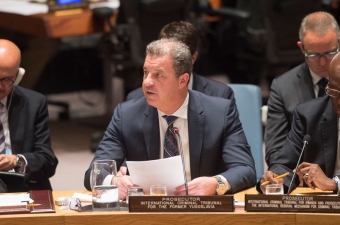Prosecutor Serge Brammertz presented today to the United Nations Security Council (UNSC) the Office of the Prosecutor’s (OTP) 24th completion strategy report, covering the period from 16 May to 15 November 2015.
The Prosecutor began his briefing by discussing the status of the final four trials and three appeals before the ICTY. The OTP is awaiting the issuance of trial judgements in two trials, Karadžić and Šešelj. In the Mladić case, the OTP remains focused on responding to the evidence presented by the defence in the minimum time necessary to fulfill its obligations. In the Hadžić case, the OTP continued to pursue all reasonable options to permit the completion of this trial. The Prosecutor informed the UNSC that the appeals judgement in the Stanišić and Simatović case and the appeals hearing in the Stanišić and Župljanin case are scheduled for next week. Finally, the OTP awaits scheduling of the appeals hearing in the Prlić et al. case.
Turning to the Category II cases transferred to the Prosecutor’s Office of BiH (PO BiH), Prosecutor Brammertz recalled that he received a commitment that prosecutorial decisions would be taken in all remaining cases by the end of the 2015, and stated, “I am pleased to report that, in large measure, this pledge has been honored.
In relation to national war crimes prosecutions more generally, Prosecutor Brammertz noted, “[T]here continues to be progress in national war crimes prosecutions, although it is uneven and fragile”. In relation to Bosnia and Herzegovina, the targets established in the National War Crimes Strategy will not be met by a significant margin, and the Prosecutor encouraged the PO BiH to dedicate its efforts to prosecuting the most complex and highest-priority cases. While important results have been achieved in Serbia, Prosecutor Brammertz emphasized that “the accountability process in Serbia is at a critical crossroads.” In this regard, he noted, “[T]he fact that last week senior government ministers escorted and welcomed a convicted war criminal, General Vladimir Lazarević, back to Serbia upon his release sends absolutely the wrong signal”. Turning to Croatia, Prosecutor Brammertz pointed out that with the transfer of a Category II case from BiH to Croatia, “[t]he Croatian judiciary now has the important opportunity to visibly demonstrate that the accountability process continues in an independent and impartial manner.” Summing up the current status of national war crimes prosecutions, Prosecutor Brammertz noted that “it is clear that throughout the former Yugoslavia, more accountability can and should be achieved.”
Prosecutor Brammertz also specifically highlighted challenges in the ongoing search for missing persons from all sides of the conflict. He noted that to move this process forward, “those who know where mass graves and other burial sites are located must be encouraged to come forward.” However, the Prosecutor further pointed out that “today, in many parts of society, war criminals are still glorified, and people providing information about missing persons risk being branded traitors and exposed to possible retribution.” Prosecutor Brammertz called upon all states in the region “to undertake prominent public awareness campaigns encouraging witnesses, including perpetrators of the crimes and their associates, to come forward with information about missing persons.”
The Prosecutor informed the Council that his Office has recently completed an extensive review of its experience over the past two decades in prosecuting conflict-related sexual violence crimes. The outcome of this study will be published in April next year and has been crafted as a practical resource to assist with prosecuting this category of crimes in the future.
Prosecutor Brammertz concluded by reflecting on the significance of the anticipated delivery of the trial judgement in the case against Radovan Karadžić in the coming months. He remarked, “While in accordance with the mandate given by this Council, my Office brought many prosecutions against military and civilian leaders from all parties to the conflicts, the Karadžić and Mladić trials perhaps best exemplify why this Tribunal was created, as well as the many challenges we have had to overcome. For that reason, their successful completion will be an unmistakable demonstration of the commitment shown by this Council, the United Nations and its Member States to international peace, security and justice.”


